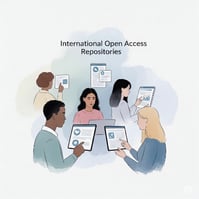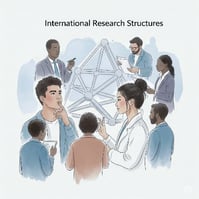Menu of Internationalization Activities
This list provides a comprehensive overview of initiatives and programs designed to advance global engagement in higher education. Organized into sections covering Research, Academic, Capacity Building, Institutional Services, Internationalization at Home, Mobility. it offers detailed definitions, benefits, impacts, and regional contexts for each activity. This resource serves as a guide for educators, administrators, and policymakers seeking to understand and implement internationalization strategies in academic institutions worldwide.
Research
African Research Universities Alliance Centers of Excellence
Definition: Thematic research hubs hosted at member universities to conduct collaborative research on African challenges, such as climate change, food security, and public health.
Benefits: Promotes high-impact research, enhances regional collaboration, and addresses local challenges.
Impacts: Elevates African research capacity, supports continental development, and strengthens global research networks.
Country Related: Pan-African
Campus-in-Campus (CiC) Initiatives
Definition: Deep partnerships where universities share campuses and functions for joint curricula and research, as seen in Japan.
Benefits: Enhances collaboration, promotes shared resources, and fosters academic integration.
Impacts: Strengthens global academic ties, supports innovation, and elevates institutional reach.
Country Related: Japan
Cátedras for Regional Integration Studies
Definition: Endowed academic chairs dedicated to studying Latin American integration, history, and culture, fostering regional identity.
Benefits: Advances regional scholarship, promotes cultural unity, and enhances academic collaboration.
Impacts: Strengthens Latin American identity, supports regional integration, and elevates research output.
Country Related: Latin America
Collaborative Doctoral Partnerships
Definition: Doctoral programs enabling students to work with multiple institutions across borders, often leading to dual degrees.
Benefits: Enhances research training, promotes global collaboration, and boosts career prospects.
Impacts: Strengthens academic partnerships, supports research innovation, and elevates global research output.
Country Related: Widespread International Practice
Cross-Border Data Sharing Initiatives
Definition: Programs enabling secure sharing of research data across global institutions to enhance collaborative research outcomes.
Benefits: Facilitates large-scale research, promotes transparency, and enhances data-driven insights.
Impacts: Improves research quality, supports global collaboration, and accelerates innovation.
Country Related: Widespread International Practice
Cross-Border Research Ethics Training
Definition: Training ensuring ethical standards in multinational research projects, promoting responsible research practices.
Benefits: Enhances research integrity, fosters trust, and ensures compliance.
Impacts: Strengthens global research standards, supports ethical collaboration, and elevates trust in research outcomes.
Country Related: Widespread International Practice
Cross-National Research Policy Dialogues
Definition: Forums where researchers and policymakers from multiple countries discuss research priorities, e.g., UNESCO’s dialogues.
Benefits: Aligns research with global needs, fosters collaboration, and informs policy.
Impacts: Strengthens science-policy linkages, supports global priorities, and enhances research impact.
Country Related: Global / Supranational
Data Libraries
Definition: Repositories sharing datasets from multiple countries, supporting global research and teaching initiatives.
Benefits: Enhances data access, promotes collaboration, and supports innovation.
Impacts: Strengthens research capacity, fosters global knowledge sharing, and supports data-driven education.
Country Related: Widespread International Practice
Global Academic Dissemination
Definition: Sharing research through international conferences, journals, and platforms to reach global audiences and enhance visibility.
Benefits: Increases research impact, fosters collaboration, and elevates recognition.
Impacts: Strengthens global knowledge exchange, supports academic reputation, and promotes innovation.
Country Related: Widespread International Practice
Global Innovation Challenges
Definition: Competitions encouraging researchers to develop solutions for global issues with international collaborators, fostering innovation.
Benefits: Promotes problem-solving, enhances collaboration, and boosts visibility.
Impacts: Drives global innovation, strengthens research networks, and addresses societal challenges.
Country Related: Widespread International Practice
Global Research Incubators
Definition: Collaborative platforms fostering early-stage international research projects, addressing global challenges with multi-institutional support.
Benefits: Enhances innovation, promotes resource sharing, and supports scalability.
Impacts: Strengthens global research ecosystems, fosters collaboration, and drives impactful solutions.
Country Related: Widespread International Practice
Global University Network Participation
Definition: Engagement in global university networks to scale innovative education models and share resources.
Benefits: Enhances collaboration, promotes innovation, and fosters resource sharing.
Impacts: Strengthens global education networks, supports scalability, and elevates institutional impact.
Country Related: Widespread International Practice
Integration of Indigenous Knowledge Systems (IKS) into Research
Definition: Formal centers and initiatives validating and incorporating local and indigenous knowledge into scientific research, particularly in agriculture, medicine, and environmental science.
Benefits: Enhances research relevance, promotes inclusivity, and preserves cultural heritage.
Impacts: Advances decolonized knowledge, strengthens local solutions, and influences global research paradigms.
Country Related: Pan-African
Interdisciplinary STEM Research Collaborations
Definition: Programs fostering collaboration across STEM disciplines to address complex global challenges, often supported by U.S. initiatives.
Benefits: Promotes innovation, enhances problem-solving, and fosters interdisciplinary synergy.
Impacts: Drives technological advancements, strengthens U.S. research leadership, and addresses global issues.
Country Related: United States
International Conferences
Definition: Events hosted by universities to facilitate global knowledge exchange and networking among researchers worldwide.
Benefits: Enhances collaboration, promotes visibility, and fosters innovation.
Impacts: Strengthens global research networks, elevates institutional reputation, and supports knowledge dissemination.
Country Related: Widespread International Practice
International Open Access Repositories
Definition: Platforms enabling global access to research outputs, promoting open science and collaboration.
Benefits: Enhances knowledge sharing, promotes equity, and supports research impact.
Impacts: Strengthens global research access, fosters open science, and supports innovation.
Country Related: Widespread International Practice
International Patenting
Definition: Processes securing patents across countries for university innovations, enhancing global commercialization.
Benefits: Protects intellectual property, promotes commercialization, and boosts revenue.
Impacts: Enhances innovation ecosystems, supports global competitiveness, and drives economic impact.
Country Related: Widespread International Practice
International Publications
Definition: Publishing research in global journals or co-authoring cross-cultural studies to enhance visibility and impact.
Benefits: Increases visibility, fosters collaboration, and enhances research impact.
Impacts: Strengthens global academic networks, supports knowledge exchange, and elevates institutional reputation.
Country Related: Widespread International Practice
International Research Capacity Training
Definition: Workshops training researchers in developing countries to participate in global research networks, enhancing skills and access.
Benefits: Builds expertise, promotes equity, and enhances collaboration.
Impacts: Strengthens global research capacity, supports North-South engagement, and fosters inclusivity.
Country Related: Global / Development
International Research Collaboration
Definition: Partnerships across countries to conduct joint research, enhancing global impact and scope.
Benefits: Enhances research quality, promotes resource sharing, and fosters innovation.
Impacts: Strengthens global research networks, addresses shared challenges, and elevates institutional outcomes.
Country Related: Widespread International Practice
International Research Consortia
Definition: Formal alliances among institutions to collaborate on large-scale research projects addressing global challenges.
Benefits: Enhances scalability, promotes resource sharing, and fosters innovation.
Impacts: Drives high-impact research, strengthens global collaboration, and supports societal progress.
Country Related: Widespread International Practice
International Research Impact Assessments
Definition: Evaluations measuring global societal impact of collaborative research, e.g., German Research Foundation’s frameworks.
Benefits: Enhances accountability, informs funding, and promotes impact-driven research.
Impacts: Strengthens research evaluation, aligns with global priorities, and elevates German research influence.
Country Related: International Practice (e.g., Germany)
International Research Mentorship Programs
Definition: Initiatives pairing early-career researchers with global mentors for career development and guidance.
Benefits: Enhances skills, fosters networking, and supports career growth.
Impacts: Strengthens global research capacity, promotes mentorship, and supports emerging talent.
Country Related: Widespread International Practice
International Research Networks
Definition: Alliances connecting researchers globally to collaborate on shared challenges, fostering networks and expertise.
Benefits: Enhances collaboration, promotes knowledge sharing, and supports innovation.
Impacts: Strengthens global research ecosystems, supports scientific progress, and addresses global issues.
Country Related: Widespread International Practice
International Research Structures
Definition: Global research units or centers fostering collaborative projects and training programs with international partners.
Benefits: Enhances research capacity, promotes collaboration, and fosters scalability.
Impacts: Strengthens global research infrastructure, supports innovation, and drives societal impact.
Country Related: Widespread International Practice
International Research Symposia
Definition: Regular academic events focusing on global issues, bringing together researchers to share findings and build partnerships.
Benefits: Enhances networking, promotes knowledge exchange, and fosters collaboration.
Impacts: Strengthens global research networks, elevates institutional visibility, and supports innovation.
Country Related: Widespread International Practice
Joint Research Programs
Definition: Collaborative research initiatives involving multiple universities targeting specific global challenges, pooling expertise.
Benefits: Enhances research quality, promotes resource sharing, and fosters innovation.
Impacts: Strengthens global partnerships, enhances research impact, and addresses societal issues.
Country Related: Widespread International Practice
Regional Thematic Networks for Research Capacity Building
Definition: Large-scale consortia of universities focused on specific challenges, like RUFORUM, sharing graduate programs and research.
Benefits: Enhances research capacity, promotes regional collaboration, and addresses local priorities.
Impacts: Strengthens African academic networks, supports development goals, and elevates research impact.
Country Related: Pan-African
Technology Transfer
Definition: Transferring academic research outcomes to international industries for societal benefit, enhancing commercialization.
Benefits: Promotes economic growth, enhances innovation, and fosters industry partnerships.
Impacts: Strengthens global innovation ecosystems, supports economic impact, and elevates research relevance.
Country Related: Widespread International Practice
Transnational Social Science Research Networks (CLACSO Model)
Definition: Collaborative working groups coordinated by a regional body (e.g., CLACSO) to study critical social issues from a regional perspective.
Benefits: Enhances research relevance, promotes collaboration, and impacts social policy.
Impacts: Strengthens Latin American research networks, supports regional advocacy, and addresses societal challenges.
Country Related: Latin America & Caribbean
University-Hosted Innovation & Entrepreneurship Hubs
Definition: Tech hubs (e.g., i-hubs) providing mentorship and resources for student startups, enhancing employability.
Benefits: Promotes innovation, fosters entrepreneurship, and enhances career paths.
Impacts: Strengthens African innovation ecosystems, supports economic growth, and elevates graduate outcomes.
Country Related: e.g., Kenya, Nigeria, Ghana, Rwanda
Virtual Collaboration Projects
Definition: Online group projects connecting students across borders to work on shared academic or research tasks, fostering global teamwork.
Benefits: Enhances collaboration skills, promotes cultural exchange, and reduces costs.
Impacts: Strengthens global networks, supports virtual education, and fosters internationalization.
Country Related: Widespread International Practice
































Frameworks
Frameworks allow administrators to explore international initiatives from operational and strategic perspectives.
